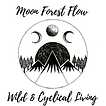Books have been an incredible way for me to undo cultural and familial conditioning and reconnect to the parent I truly want to be. I know that a lot of parents are against doing any reading about parenting because they either have a clear idea about what they want to do or they want to feel into their intuition and I get that. Also, the majority of parenting books are full of tosh.
Ideally, I would like to parent intuitively but I, like many, had a traumatic childhood, was mostly unparented and live in a low-nurture culture that doesn’t respect baby’s or children’s rights, needs or biology. So I didn’t have much to go on and I knew I’d need to undo a lot of conditioning.
When Dolores was a baby following my intuition was what led me to many of the books I found. I was being told to do one thing whilst feeling it was absolutely impossible or not at all what she or I wanted to be doing. For example, we were told she wasn’t to sleep in the bed or on us but she only wanted to sleep on us and so we completely broke ourselves and put ourselves into many a more dangerous situation with her than we would have if we’d just brought her into a safe bed from the start and slept in a safe chest sleeping position where needed (which was often in those early days). It was a book on normal infant sleep that guided me towards the normality and safety of these practices.
I found rewilding babydom relatively easy once I got going. Guided by our ancestral past through anthropological books such as The Continuum Concept by Jean Liedloff and Mothers & Others by Sarah Blaffer Hrdy, I felt assured in my choices to carry her pretty much continuously, forget about tummy time, co-sleep, chest sleep, feed on demand and spend lots of time outdoors and in community.
And then toddlerdom hit and it was another world. I have found this era hard but incredibly healing. An opportunity to meet and hold the big emotions of another in a way that I never received. Sadness I can meet with ease but I was struggling to know how to respond to the hitting, biting, strangling and slapping that would come up sometimes. I had read an incredible book called Hunt Gather Parent by Michaeleen Doucleff when Dolores was 6 months old but a lot of it washed over at that point as many of the issues being discussed just weren't present at that point but I remembered it had some tips for this age. So when Dolores was nearing 2 I revisited it to see what guidance I might find.
I found it supremely helpful and some of the things I've read and implemented have significantly changed the way our days run. And in fact, I find them incredibly intuitive. It's definitely my natural style. A little bit like in the early days feeling assured that I was ok to be holding my baby a lot, sleeping with her and feeding her on demand, I felt assured in my impulse not to praise or punish, to allow a lot of autonomy and to provide a wordless quiet space a lot of the time.
Although it was refreshing to hear that most traditional cultures around the world completely expect and accept big emotions and difficult behaviours in their toddlers, which shapes the way they respond, I was still not completely clear on the best way to respond to my own toddler slapping me in the face or wrestling other children to the floor. I think this is because anger and difficult feelings are where some of our deepest conditioning lies in the industrialised West. Even though we know categorically that children are benevolent creatures having difficult feelings, many of the standardised ways of responding assume that they are doing what they're doing on purpose and with intent and our culture certainly doesn't have a healthy response to anger.
I would love to be able to turn away from her hitting with no words and no reaction and continue with my activities as per the elders in the famously angerless Inuit culture. It makes a whole lot more sense to me than what I had read in gentle parenting books, that I should be engaging her in complex dialogues about her feelings. Even as an adult that would frustrate the hell out of me. When we're behaving irrationally and angrily it's because we've lost control and what we need is to re-regulate before we do anything else. There's absolutely no point trying to talk in this state for either party. Words are stimulating and stimulation is certainly not needed in this situation. Other methods suggest I hold her hands until she stops but I'm categorically against non-consensual restraint of any kind in parenting so that doesn't work for us either...
This article continues in full over on my Patreon page. Sign up for a free 7-day trial to read it for free. Wild & cyclical yoga, meditation, nidra, parenting and much more.
Carly x

Comments